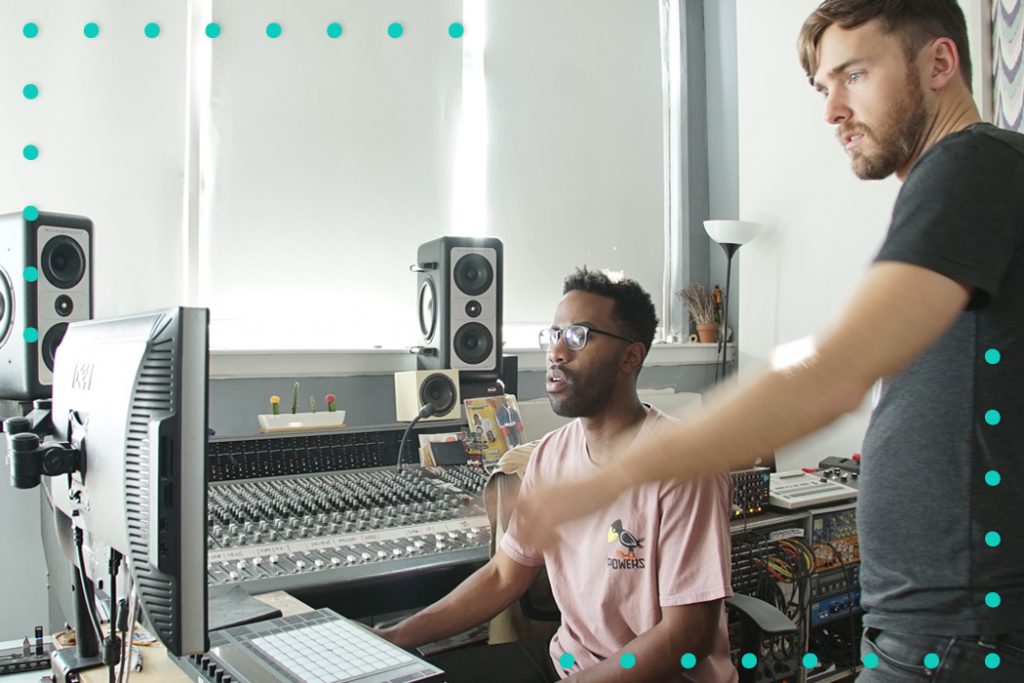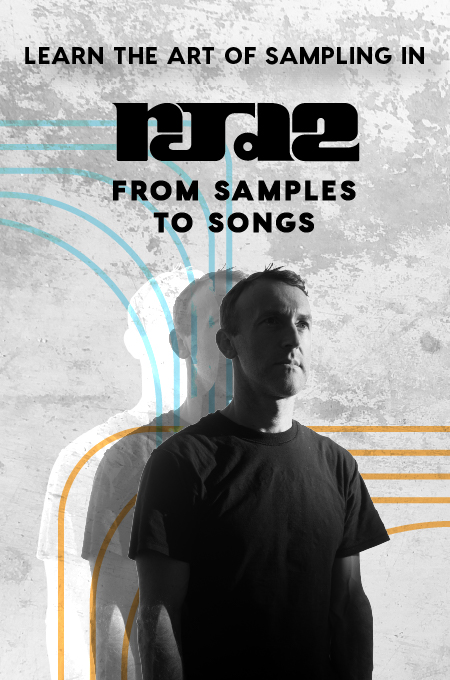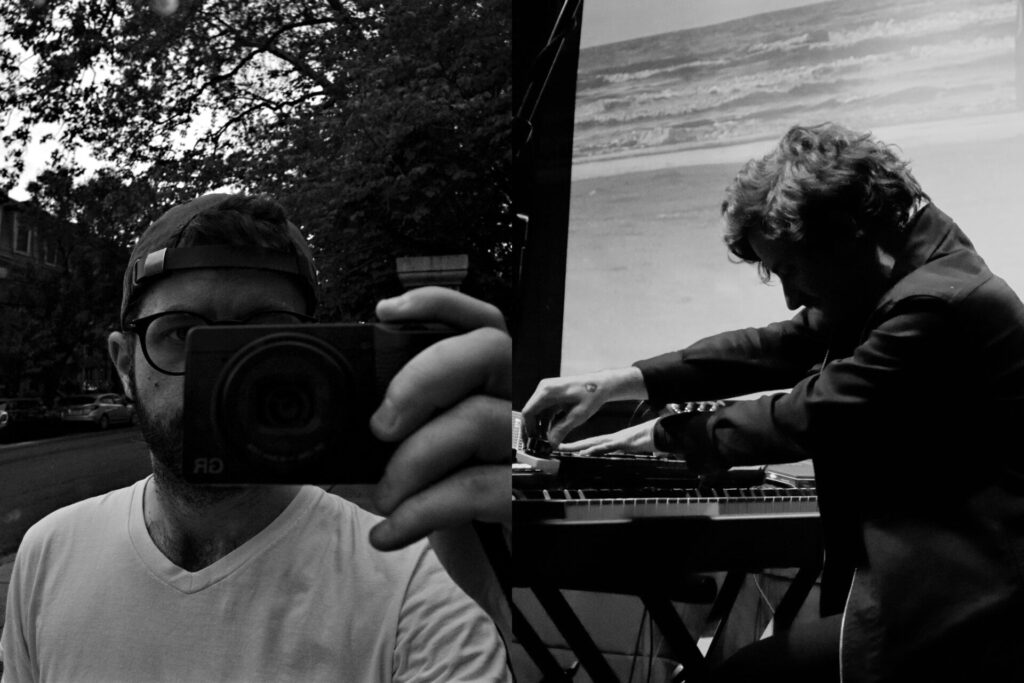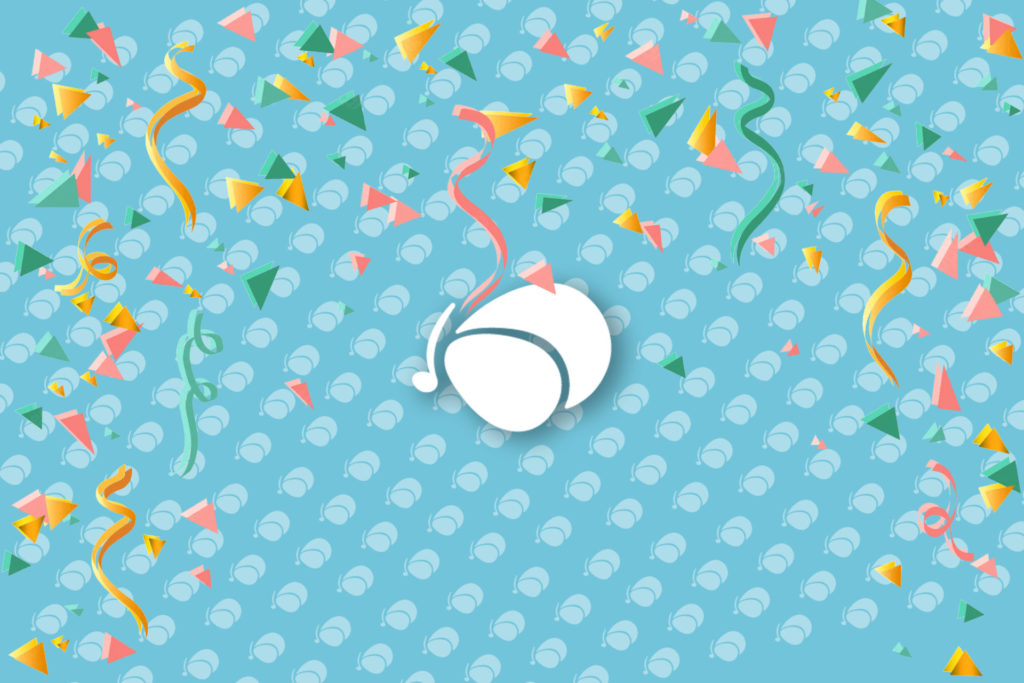When we started Soundfly, we set out to create a better way to learn online. But what does that actually mean?
All of us on the team had spent time learning things online before. We’d had some great experiences (Code School, Duolingo), some mediocre experiences (some MOOCs), and some dismal experiences (YouTube, other MOOCs).
One of the things we consistently found was a vast over-reliance on “knowledge dissemination as learning.” It makes sense — the internet has made it easier than ever before to access information. That’s its defining feature. Online courses simply jumped on the bandwagon, offering videos, articles, tutorials, and all kinds of new ways for people to ingest information.
But we asked: Were people actually learning anything? Is there a more effective way to promote actual life-long learning?
Simply Watching Videos Is Not Learning
Before starting Soundfly, I worked in high schools supporting young people in developing and pursuing their passions, dreams, and goals. In this work, one of the things I saw over and over again was something that many teachers think is common knowledge: That students learn more when they actively engage with content than they do when passively consuming information.
In fact, there’s plenty of evidence out there that lectures, video watching, and reading on their own are not very effective learning methods at all. Here’s one study. Here are some others.
Reading, watching videos, and listening to lectures are all examples of what’s called passive learning, and while it can be fun and can certainly teach you new things, it’s just not that effective at leading to long-term mastery. On the opposite side of the coin, active learning, when students actively engage with the content through practice, recall, projects, discussions, or more, has been shown to be much more effective.
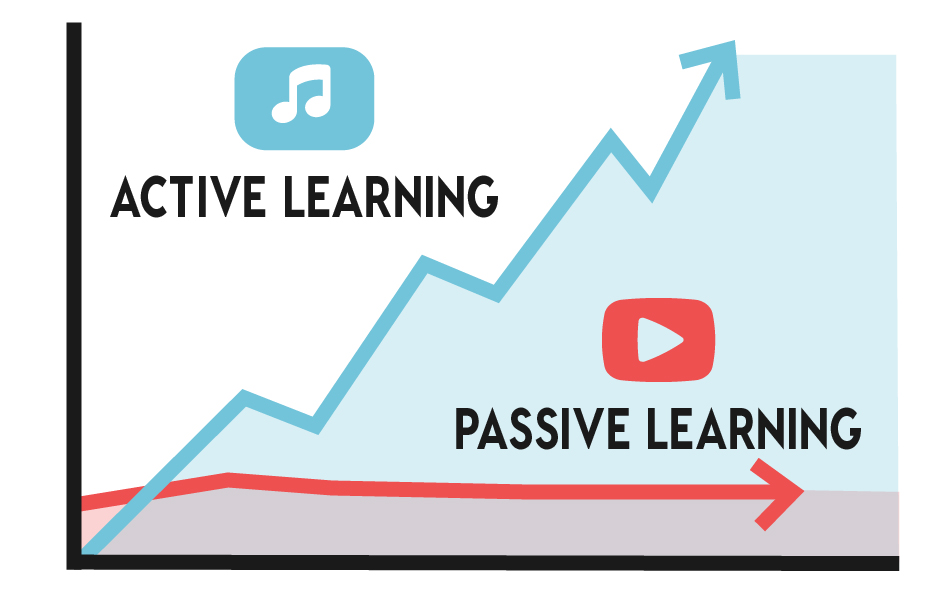
While many teachers already know that, most DIY or self-driven learners don’t. Too many of us still spend all our free time watching countless videos or reading and re-reading articles, rather than actually engaging with the material and pushing ourselves forward in ways that will stick.
We at Soundfly set out to do something different to support these learners. So we built our model on a few core concepts that are backed up by research to help students learn more efficiently and more effectively:
- Highly constrained activities that build motivation and practice recall.
- In-depth, nuanced feedback from an expert.
- Social accountability and peer support.
- Personalized adjustments based on student needs.
All of these ideas attempt to put active learning at the forefront, and help our students grow in new and better ways.
Breaking Down Big Goals into Small Steps
One of our first commitments is to never teach a new concept without offering students a way to put it into action right away. All of our courses and many of our articles demonstrate this focus on action, whether via short quizzes, quick prompts, or discussion questions.
Recently, we’ve taken this approach to the next level throughout our premium Mainstage courses and in the work of our Soundfly Mentors. All of our Mainstage courses include weekly activities and challenges that push students to engage with the content right away in small, achievable ways. They also have a Soundfly Mentor available via email or Slack to support them if they need it.
We’ve designed all of these weekly activities according to three over-arching principles:
- Relevancy. We want activities that have a clear connection to a student’s learning goals. Otherwise, why should they stay engaged?
- Constraints. “Writing an original song” is really daunting, but “writing a melody in C major using only chord tones” is really easy and pushes you forward toward that larger goal. We try to always use constraints so that nothing feels too big based on where a student is.
- Steadily Escalating Difficulty. We try to make activities that get slightly more challenging as you go through them so that you are never too frustrated, bored, or want to give up.
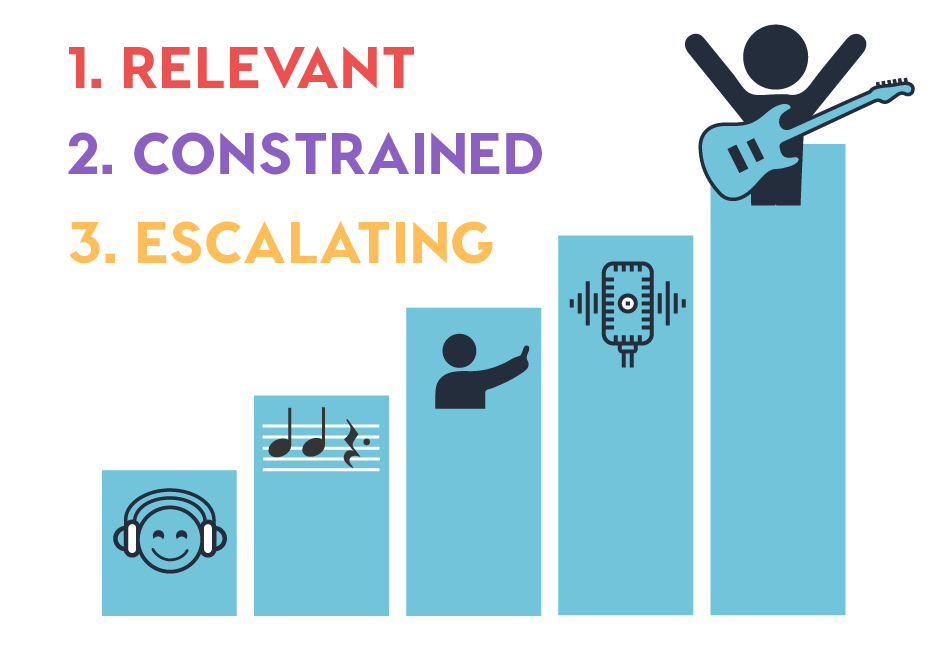
The idea of using constraints and escalating difficulty builds on Mihaly Csikszentmihalyi famous concept of “flow” that’s often cited by game designers. It’s easier to stay motivated when there’s a balance between the challenges you’re facing and the skills you have to deal with them. Too difficult and you get frustrated. Too easy and you get bored.
It also builds on Anders Ericsson’s concept of “deliberate practice.” Practice on its own won’t necessarily make you better. Practicing in such a way that pushes you gradually out of your comfort zone and focuses on the areas where you’re struggling will.
All of these concepts share the common thread of trying to make it easy to take offline action. We imagine our best courses as a steadily escalating series of fun challenges that push you toward the ever-widening edge of your abilities. We want students to be able to see their progress week-to-week, without having a creative meltdown in the process.
Giving Students Targeted, In-Depth Feedback
We know that targeted feedback is important to growth. Ericsson talks about this in his book Peak: Secrets from the New Science of Expertise. He uses the example of doctors who often don’t get feedback on whether they made the correct treatment decision until months later. This makes it really difficult for them to improve in their roles. Instead, he suggests using data from past case studies to design better learning environments that give doctors immediate feedback on their decisions.
We’ve thought about a similar challenge in how we approached our model. Really good targeted feedback can be hard to replicate online or through technology, especially when it comes to a creative art like music. A computer might be able to tell you whether you got a note right or wrong, but it can’t tell you whether you’ve achieved your artistic intentions.
That’s where our Soundfly Mentors come in.
Our Soundfly Mentors are like personal trainers, but for your music. They challenge you with the constrained, relevant activities we described above, and then offer you feedback based on what you produce. In this way, they’re able to help you figure out what specifically you need to focus on in order to achieve the sound you want or reach the goals you set for yourself.
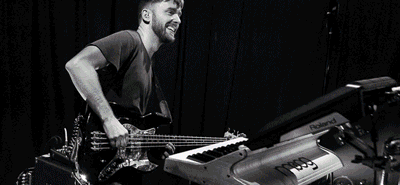
There is no substitute for thoughtful, critical, and comprehensive feedback from someone who knows what they’re talking about. Our Mentors might not be quite as immediate as someone standing in the room with you, but they’re not far off.
Providing Social Accountability and Peer Support
The other value our Soundfly Mentors provide is an obvious one: They help you stay accountable to your goals! This is where the personal trainer comparison gets real. Just like a personal trainer at your local gym, our Mentors are here to push you, encourage you, and hold your hand so you reach that new resolution you set yourself.
We all face the same issues when it comes to our art. We procrastinate. We prevaricate. We get busy. We struggle to achieve the big targets we set for ourselves. We become perfectionists and never hit publish.
Your Soundfly Mentor is there not only to help you blast any obstacles out of your way, but also to simply help you stay accountable to your goals by setting clear deadlines and strategizing ways to meet them. They can brainstorm productivity techniques with you, or simply check in with you frequently to see how things are going.
The other thing we’ve done to try to improve upon this social accountability is create a community Slack group for all students working with Soundfly Mentors. This means that these students can also hold each other accountable by posting work, brainstorming solutions to scheduling challenges, and just generally creating more momentum around posting and publishing music — like a real classroom, just without the paper airplanes.
While I don’t have any big meta-studies to cite here, we all know how powerful it can be to have someone invested in your success helping you stay on track along the way.
Personalizing Learning Based on Students’ Interests and Needs
In the early 20th century, education theorist John Dewey proposed that learning would be more effective and students more motivated if the learning was relevant to their interests. Since then, countless educators and researchers have documented the same thing.
The idea of “personalized learning” is a hot topic in education circles these days. But too often, it’s used to simply mean algorithmic personalization based on certain choices a student makes on a computer. There are lots of exciting possible applications of this sort of technology, but we’ve designed our courses with a very concrete commitment to personalization in mind, using actual humans.
Our Soundfly Mentors are allowed the freedom to adjust the course curriculum for any course as necessary to make it applicable to a student’s personal goals. That might mean pulling from their own personal experiences or finding other resources online. It might mean simply adjusting the activities and challenges, or targeting their feedback in a certain direction.
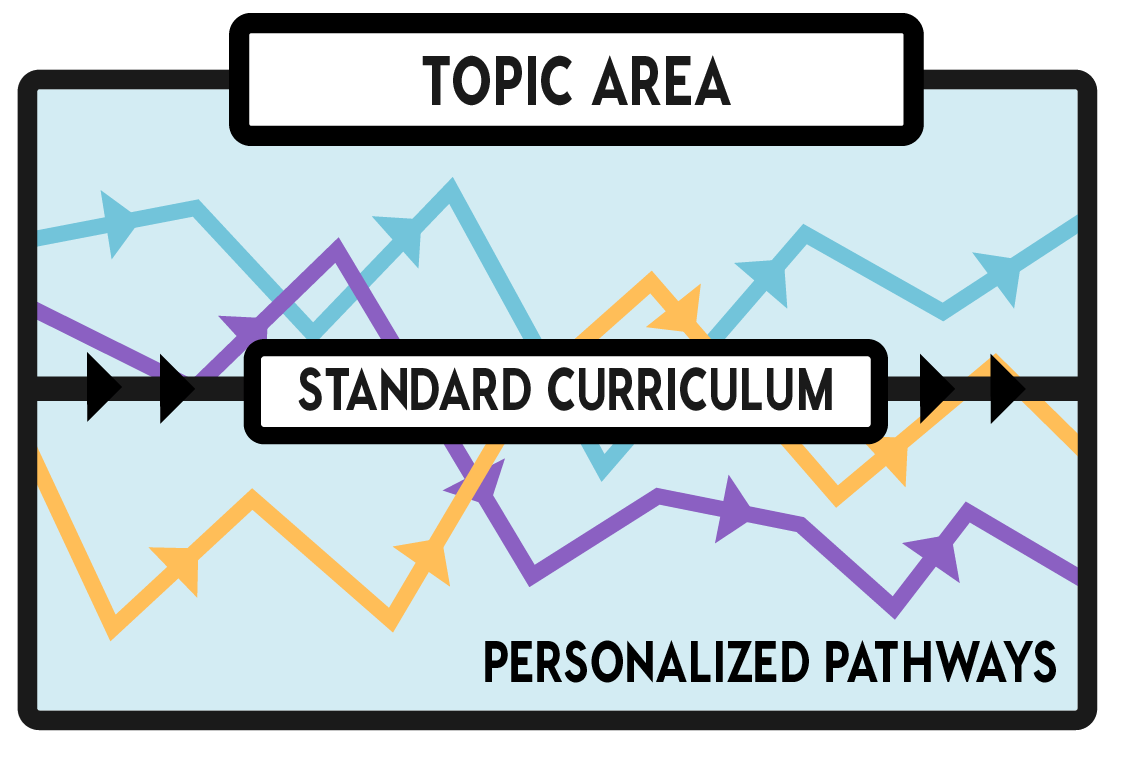
With an art form like music, there often isn’t one right answer. Sure, a lot of people still teach the Euro-centric classical rules of music theory and arranging, but we believe that art is simply about intentionality and creating the work that inspires you. Knowing the rules can help you get there, but they are not necessary.
Having the ability to personalize someone’s learning pathway helps ensure that all the learning stays relevant to their real life goals.
Continuing to Learn and Create a Community of Practice
We’re really excited by the success our model of personalized mentorship has shown so far and some of the awesome student work that’s come out of it, but we’re still just at the start of this endeavor.
One of the big ideas we’re working on exploring next is how to create a more supportive “community of practice.” This idea was coined by theorists Etienne Wenger and Jean Lave in the early ’90s to describe the phenomenon of people with a shared passion interacting regularly and in doing so, pushing themselves forward, whether intentionally or not. A supported and active community of practice can include a vast spectrum of expertise, but always gathers around a shared interest with a commitment to practical application, over an extended period of time.
Our six-week course length, personal Mentors, and commitment to practical application are well-suited to the concept of communities of practice. We aim to continue brainstorming and experimenting to create more opportunities for a community to develop on its own, with our Mentors as expert moderators and advisors, but community members supporting each other and interacting on their own as well.
Looking farther ahead, we’re not sure where we’ll end up down the road, but we do know that we’ll continue pursuing the best ways to help people learn music online!
If you want to sign up for one of our Mainstage courses and work with a Soundfly Mentor, check out the courses we currently have available here or sign up to work with a Mentor on a project of your choosing!
• • •
Other resources to check out:
Peak: Secrets from the New Science of Expertise. By Anders Ericsson and Robert Pool.
Make It Stick: The Science of Successful Learning. By Peter C. Brown, Henry L. Roedinger III, and Mark A. McDaniel.
The Collected Works of John Dewey. By John Dewey.
Improve your music with creativity & curiosity on Soundfly.
Subscribe to our YouTube channel for weekly videos, or join Soundfly’s all-access membership to all of our artist-led online music courses, an invite to join our Discord community forum, exclusive discount perks from partner brands, access to artist Q&As and workshops, and more.
